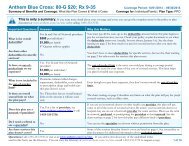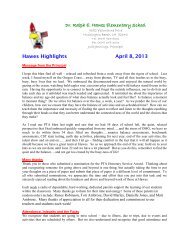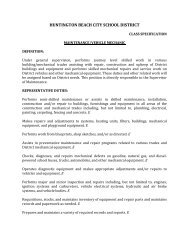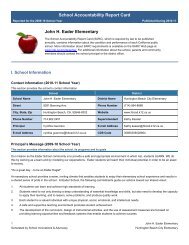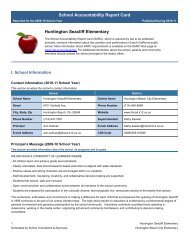Parent Notice of Procedural Safeguards - Huntington Beach City ...
Parent Notice of Procedural Safeguards - Huntington Beach City ...
Parent Notice of Procedural Safeguards - Huntington Beach City ...
Create successful ePaper yourself
Turn your PDF publications into a flip-book with our unique Google optimized e-Paper software.
WEST ORANGE COUNTY CONSORTIUM FOR SPECIAL EDUCATION<br />
<strong>Notice</strong> to <strong>Parent</strong>/Guardian/Surrogate<br />
<strong>Notice</strong> <strong>of</strong> <strong>Procedural</strong> <strong>Safeguards</strong><br />
This notice is provided to you as parents, legal guardians, surrogate parents or court appointed responsible adult,<br />
because your child is receiving special education services or has been referred for possible placement in special<br />
education. This information is your <strong>Notice</strong> <strong>of</strong> <strong>Procedural</strong> <strong>Safeguards</strong> (<strong>Notice</strong>) as required under the Individuals with<br />
Disabilities Education Act (IDEA). The IDEA is a federal law that requires school districts to provide a “free appropriate<br />
public education” (FAPE) to eligible children with disabilities, as defined further below. This <strong>Notice</strong> will also be provided to<br />
students who are entitled to these rights at age eighteen (18). The purpose <strong>of</strong> this <strong>Notice</strong> is to explain to you your rights<br />
as a parent <strong>of</strong> a child with disabilities under federal and state laws. In California, special education is provided to disabled<br />
students between birth and twenty-one (21) years <strong>of</strong> age. Federal and state laws protect you and your child throughout<br />
the procedures for evaluation and identification <strong>of</strong> special education placement and services. A copy <strong>of</strong> this <strong>Notice</strong> will be<br />
given to you (1) once a school year; (2) upon initial referral or your request for evaluation; (3) upon the receipt <strong>of</strong> the first<br />
filing <strong>of</strong> a state complaint or due process compliant; (4) when a decision is made to make a disciplinary change <strong>of</strong><br />
placement; or (5) upon your request. The definitions below will help you understand the statement <strong>of</strong> rights.<br />
(20 U.S.C. section 1415(d); 34 C.F.R. section 300.504; Education Code section 56301(d)(2).)<br />
DEFINITIONS<br />
Children With Disabilities is defined by federal law as a child with mental retardation, hearing impairments (including<br />
deafness), speech or language impairments, visual impairments (including blindness), emotional disturbance, orthopedic<br />
impairments, autism, traumatic brain injury, other health impairments, specific learning disabilities, deaf-blindness, or<br />
multiple disabilities; and who by reason there<strong>of</strong>, needs special education and related services.<br />
(20 U.S.C. section 1402(3); 34 C.F.R. section 300.8; Education Code section 56026.)<br />
Evaluation means the assessment <strong>of</strong> your child using various tests and measures in accordance with state and federal<br />
laws to determine whether your child has a disability and the nature and extent <strong>of</strong> special education and related services<br />
needed by your child for his or her educational benefit. The assessment tools are individually selected for your child and<br />
are administered by trained and knowledgeable pr<strong>of</strong>essionals employed or contracted by the school district. These tests<br />
do not include the basic tests given to all children in the school setting.<br />
(34 C.F.R. sections 300.15, 300.304 – 300.311; Education Code sections 56302.5 and 56320.)<br />
Free Appropriate Public Education (FAPE) is defined by federal law as special education and related services (1)<br />
provided at public expense, under public supervision and direction, and without charge to you; (2) meets the standards <strong>of</strong><br />
the California Department <strong>of</strong> Education (CDE); (3) is provided in conformity with a written Individualized Education<br />
Program (IEP) developed for your child to confer an educational benefit and (4) is provided in an appropriate preschool,<br />
elementary or secondary school program <strong>of</strong> the State, or in a nonpublic school if there is no appropriate program available<br />
in a school district.<br />
(20 U.S.C. section 1402(9); 34 C.F.R. section 300.17; Education Code section 56040.)<br />
Least Restrictive Environment (LRE) means that to the maximum extent appropriate, children with disabilities will be<br />
educated with children who are not disabled, and that special classes, separate schooling, or other removal <strong>of</strong> children<br />
with disabilities from the regular education environment will occur only when the nature or severity <strong>of</strong> the disability is such<br />
that education in regular classes with the use <strong>of</strong> supplementary aids and services cannot be achieved satisfactorily.<br />
(20 U.S.C. section 1412(a)(5); 34 C.F.R. section 300.114; Education Code section 56040.1)<br />
Related Services means transportation and such developmental, corrective and supportive services that may be required<br />
to assist a child with a disability to benefit from special education, including the early identification and assessment <strong>of</strong><br />
disabling conditions. Related services may also include:<br />
1. Speech-language pathology and audiology services.<br />
2. Interpreting services.<br />
3. Psychological services.<br />
4. Physical and occupational therapy.<br />
5. Recreation, including therapeutic recreation.<br />
1<br />
Rev. January 15, 2009
6. Counseling services, including rehabilitation counseling.<br />
7. Orientation and mobility services.<br />
8. School nurse services.<br />
9. Medical services for diagnostic or evaluation purposes only.<br />
10. Social work services.<br />
11. <strong>Parent</strong> counseling and training.<br />
(20 U.S.C. section 1402(26); 34 C.F.R. section 300.34; Education Code section 56363.)<br />
Special Education means specially designed instruction, at no cost to parents, to meet the unique needs <strong>of</strong> a child with a<br />
disability, including instruction conducted in the classroom, in the home, in hospitals and institutions, and in other settings,<br />
and instruction in physical education.<br />
(20 U.S.C. section 1402(29) 34 C.F.R. section 300.39 Education Code section 56031.)<br />
ACCESS TO EDUCATIONAL RECORDS<br />
All parents <strong>of</strong> a child enrolled in the school district have the right to inspect records under the federal Family<br />
Educational Rights and Privacy Act (FERPA), which has been implemented in the California Education Code. Under the<br />
federal and state law, parents <strong>of</strong> a child with disabilities (including noncustodial parents whose rights have not been<br />
limited) are presumed to and have the right to inspect and review all educational records regarding your child, the<br />
provision <strong>of</strong> a FAPE and to receive an explanation and interpretation <strong>of</strong> the records without unnecessary delay, including<br />
prior to a meeting regarding your child’s IEP or before a resolution session or due process hearing. Under California<br />
statutes, parents have the right to review and to receive copies <strong>of</strong> educational records. These rights transfer to a pupil<br />
who is eighteen (18) years old unless the pupil has had a conservator appointed by a court to assume the educational<br />
rights <strong>of</strong> the pupil.<br />
The custodian <strong>of</strong> records at each school site is the principal <strong>of</strong> the school. The district custodian <strong>of</strong> records is the<br />
Director <strong>of</strong> Special Education. Pupil records may be kept at the school site or the district <strong>of</strong>fice, but a written request for<br />
records at either site will be treated as a request for records from all sites. The custodian <strong>of</strong> records will provide you with<br />
a list <strong>of</strong> the types and locations <strong>of</strong> pupil records (if requested). A request for a copy <strong>of</strong> your child’s special education<br />
records may be made to the District’s Director <strong>of</strong> Special Education.<br />
A review and/or copies <strong>of</strong> educational records will be provided to the parent within five (5) business days after the<br />
request is made by the parent, either orally or in writing. A fee for copies, but not the cost to search and retrieve, is<br />
determined by local policy and will be charged unless charging the fee would effectively deny access to the parent. Once<br />
a complete copy <strong>of</strong> the records has been provided, a fee will be charged for additional copies <strong>of</strong> the same records.<br />
(20 U.S.C. section 1232g, 34 C.F.R. section 99.1-99.67; 34 C.F.R. section 300.613; Education Code sections 49060-<br />
49079; Education Code sections 56041.5, 56043(n) and 56504.)<br />
PRIOR WRITTEN NOTICE<br />
The IDEA requires school districts to provide prior written notice to you as the parent <strong>of</strong> a child with disabilities<br />
when the school district proposes or refuses to initiate or change the identification, evaluation or educational placement <strong>of</strong><br />
your child or the provision <strong>of</strong> a FAPE to your child or if you revoke consent in writing for the continued provision <strong>of</strong> special<br />
education and related services. The notice will be provided in your native language, unless it is clearly not feasible to do<br />
so.<br />
The prior written notice must include:<br />
1. A description <strong>of</strong> the action proposed or refused by the school district.<br />
2. An explanation <strong>of</strong> why the school district proposes or refuses to take the action.<br />
3. A description <strong>of</strong> each evaluation procedure, assessment, record, or report the school district used as a<br />
basis for the proposed or refused action.<br />
4. A description <strong>of</strong> other options that the IEP team considered and the reasons why those options were<br />
rejected.<br />
5. A description <strong>of</strong> other factors that are relevant to the school district’s proposal or refusal.<br />
6. A statement that the parents <strong>of</strong> a child with a disability have protection under the procedural safeguards,<br />
and if this notice is not an initial referral for evaluation, the means by which a copy <strong>of</strong> a description <strong>of</strong> the<br />
procedural safeguards can be obtained.<br />
7. Sources for parents to contact to obtain assistance in understanding the provisions <strong>of</strong> this part.<br />
(20 U.S.C. section 1415(c); 34 C.F.R. sections 300.503 and 300.300(b)(4); Education Code section 56500.4.)<br />
2<br />
Rev. January 15, 2009
INFORMED PARENTAL CONSENT<br />
The IDEA requires that school districts obtain informed consent from you before the commencement <strong>of</strong> an initial<br />
evaluation <strong>of</strong> your child to determine if your child qualifies as a child with disabilities. Informed consent means you have<br />
been fully informed in your native language, or other mode <strong>of</strong> communication, <strong>of</strong> all information about the action for which<br />
you are giving consent and that you understand and agree in writing to the evaluation and educational placement decision<br />
for your child. Your consent is voluntary and may be withdrawn at any time. Your consent for the initial evaluation does<br />
not imply or grant consent for placement and receipt <strong>of</strong> special education and related services. The school district will<br />
request your consent for special education and related services separately and at a later date. The school district will also<br />
obtain your informed consent for reevaluations <strong>of</strong> your child and will not conduct a reevaluation unless you fail to respond<br />
to requests for your consent.<br />
If you do not provide consent for an initial assessment or fail to respond to a request to provide the consent, the<br />
school district may pursue the initial assessment by utilizing due process procedures.<br />
If you refuse to consent to the initiation <strong>of</strong> special education and related services, the school district must not<br />
provide special education and related services and shall not seek to provide services through due process procedures.<br />
If at any time after the initial provision <strong>of</strong> special education and related services, you revoke consent in writing for<br />
the continued provision <strong>of</strong> special education and related services after having consented to those services in the past, the<br />
school district must provide you prior written notice before ceasing the provision <strong>of</strong> special education and related services<br />
to your child and shall not seek to provide services through due process procedures.<br />
If you consent in writing to the receipt <strong>of</strong> special education and related services for your child but do not consent<br />
to all <strong>of</strong> the components <strong>of</strong> the IEP, those components <strong>of</strong> the program to which you have consented must be implemented<br />
so as not to delay providing instruction and services. If the school district determines that the proposed special education<br />
program component to which you do not consent is necessary to provide a free appropriate public education to your child,<br />
the school district must file a request for a due process hearing. If a due process hearing is held, the hearing decision<br />
shall be final and binding.<br />
In the case <strong>of</strong> reevaluations, the school district must document reasonable measures to obtain your consent. If<br />
you fail to respond, the school district may proceed with the reevaluation without your consent.<br />
(20 U.S.C. sections 1414(a)(1)(D), 1414(c) and 1415; 34 C.F.R. sections 300.9 and 300.300; Education Code sections<br />
56021.1, 56321(c) and (d), 56346, 56381(f) and 56506(e).)<br />
When a parent cannot be identified and the school district cannot locate the whereabouts <strong>of</strong> a parent, the school<br />
district must ensure that an individual is assigned to act as a surrogate for the parents <strong>of</strong> a child with a disability. A<br />
surrogate parent may also be appointed for unaccompanied homeless youth or a child who is a dependent or ward in<br />
which an educational representative has not been appointed by the Court.<br />
(20 U.S.C. section 1415(b)(2); 34 C.F.R. section 300.519; Education Code section 56050; CA Rules <strong>of</strong> Court Rule 5.650.)<br />
PROTECTION IN EVALUATION PROCEDURES<br />
Federal law refers to “evaluation” and California law refers to “assessment.” Therefore, these words may be used<br />
interchangeably by employees <strong>of</strong> the school district and in this <strong>Notice</strong>. The school district must provide you with a written<br />
assessment plan or prior written notice within fifteen (15) days after a referral for special education has been received,<br />
including your written request for evaluation. You will have a minimum <strong>of</strong> fifteen (15) days in which to review the<br />
assessment plan and to provide consent to the school district to conduct the written assessment. You may request<br />
assessment in additional areas <strong>of</strong> suspected disability. Thereafter, the school district has sixty (60) days after receipt <strong>of</strong><br />
your written consent to complete the assessment and to develop an IEP to determine the educational needs <strong>of</strong> your child.<br />
However, this timeline is extended by periods <strong>of</strong> school holiday or vacation, if you refuse to make your child available for<br />
assessment, or if your child transfers to another school district and you and the receiving school district agree to a specific<br />
time when the assessment will be completed.<br />
The IDEA states that in conducting the evaluation the school district will:<br />
1. Use a variety <strong>of</strong> assessment tools and strategies to gather relevant functional, developmental and<br />
academic information, including information provided by the parent, that may assist in determining whether<br />
the child is a child with a disability and the content <strong>of</strong> the child’s IEP, including information related to<br />
3<br />
Rev. January 15, 2009
enabling the child to be involved in and progress in the general curriculum or, for preschool children, to<br />
participate in appropriate activities;<br />
2. Not use any single procedure as the sole criterion for determining whether a child is a child with a disability<br />
or determining an appropriate educational program for the child; and<br />
3. Use technically sound instruments that may assess the relative contribution <strong>of</strong> cognitive and behavioral<br />
factors, in addition to physical or developmental factors.<br />
The school district will also make sure that tests and other evaluation materials used to assess your child are<br />
selected and administered so as not to be racially, culturally or sexually discriminatory and are provided and administered<br />
in the child’s native language or other mode <strong>of</strong> communication, unless it is clearly not feasible to do so. Any standardized<br />
tests that are given to the child will have been validated for the specific purpose for which they are used, administered by<br />
trained and knowledgeable personnel, and administered in accordance with any instructions provided by the producer <strong>of</strong><br />
such tests. Your child will be assessed in all areas <strong>of</strong> suspected disability and the school district will use assessment<br />
tools and strategies that provide relevant information that will directly assist the school district in determining the<br />
educational needs <strong>of</strong> your child. Upon completion <strong>of</strong> the administration <strong>of</strong> evaluation materials, the determination <strong>of</strong><br />
whether the child is a child with a disability will be made by you and qualified pr<strong>of</strong>essionals comprising the IEP team. A<br />
copy <strong>of</strong> the evaluation report and documentation <strong>of</strong> the determination <strong>of</strong> eligibility will be given to you.<br />
In making a determination <strong>of</strong> eligibility, your child will not be determined to be a child with a disability due to a lack<br />
<strong>of</strong> instruction in reading or math or as a result <strong>of</strong> limited English pr<strong>of</strong>iciency.<br />
As part <strong>of</strong> an initial evaluation (if appropriate) and as part <strong>of</strong> any reevaluation under this section, the IEP Team<br />
and other qualified pr<strong>of</strong>essionals, as appropriate, will:<br />
1. Review existing evaluation data on the child, including evaluations and information provided by you,<br />
current classroom-based assessments and observations, and teacher observation; and<br />
2. On the basis <strong>of</strong> that review, and input from you, identify what additional data, if any, are needed to<br />
determine:<br />
a. Whether the child has a particular disability, or, in case <strong>of</strong> reevaluation <strong>of</strong> a child, whether the<br />
child continues to have such a disability and such educational needs;<br />
b. The present levels <strong>of</strong> performance and related developmental needs <strong>of</strong> the child;<br />
c. Whether the child needs special education and related services, or in the case <strong>of</strong> a reevaluation<br />
<strong>of</strong> a child, whether the child continues to need special education and related services; and<br />
d. Whether any additions or modifications to the special education and related services are needed<br />
to enable the child to meet the measurable annual goals set out in the IEP <strong>of</strong> the child and to<br />
participate, as appropriate, in the general curriculum.<br />
Generally, a reevaluation is required every three (3) years. However, if the IEP Team determines that no<br />
additional data is needed to determine whether your child continues to be a child with a disability and to determine the<br />
child’s educational needs the school district will notify you as to the reasons the school district believes a reevaluation is<br />
not necessary. After receiving this notice, you may request a reevaluation <strong>of</strong> your child. If the school district does not<br />
receive a reevaluation request from you, the school district will not conduct a reevaluation <strong>of</strong> your child.<br />
Before determining that your child is no longer a child with a disability, the school district must conduct an<br />
assessment in accordance with the procedures discussed above.<br />
(20 U.S.C. sections 1414, 1415, 34 C.F.R. sections 300.301 – 300.306; Education Code sections 56320,56321, 56329,<br />
and 56381.)<br />
INDEPENDENT EDUCATIONAL EVALUATION<br />
After the school district has completed its evaluation and if you disagree with the school district’s evaluation <strong>of</strong><br />
your child, you have the right to request an independent educational evaluation at school district expense. Upon your<br />
request for an independent educational evaluation, the school district will provide you with information about where to<br />
obtain an independent educational evaluation and the district’s criteria applicable for independent educational evaluations.<br />
A parent is entitled to only one (1) independent educational evaluation at public expense each time the district conducts<br />
an evaluation with which the parent disagrees. However, if the school district disagrees that an independent educational<br />
evaluation is necessary, the school district must request a hearing before a due process hearing <strong>of</strong>ficer to dispute your<br />
request for an independent educational evaluation and to show that the school district’s assessment is appropriate. If the<br />
school district prevails, you still have the right to an independent evaluation but not at public expense. If you choose to<br />
4<br />
Rev. January 15, 2009
obtain an independent educational evaluation at your own expense, the results <strong>of</strong> the assessment must be considered by<br />
the district. The independent educational evaluation must comply with all <strong>of</strong> the requirements that apply to school district<br />
evaluations.<br />
If the school district observes your child in his or her classroom during an assessment, or if the school district<br />
procedures provide for in-class observations, an equivalent opportunity must be provided for any independent educational<br />
evaluation in the current and any proposed educational placement.<br />
If you unilaterally place your child in a nonpublic school and you propose the placement in the nonpublic school to<br />
be publicly financed, the school district must be given the opportunity to first observe the proposed placement and your<br />
child in the proposed placement.<br />
(20 U.S.C. section 1415(b)(1); 34 C.F.R. section 300.502; Education Code section 56329.)<br />
IEP MEETINGS<br />
As the parent or legal guardian <strong>of</strong> a special education student, you have the right to be a part <strong>of</strong> the IEP Team<br />
and participate in any meeting regarding the identification, assessment and educational placement <strong>of</strong> your child. The term<br />
IEP or Individualized Education Program means a written document for each child with a disability that is developed,<br />
reviewed and revised in accordance with federal and state law. The IEP includes the child’s present levels <strong>of</strong> academic<br />
achievement and functional performance and must consider your concerns as a parent for improving the education <strong>of</strong><br />
your child. As a parent or legal guardian, you have the right to be a member <strong>of</strong> any group that makes decisions with<br />
respect to the educational placement <strong>of</strong> your child. You also have the right to bring individuals who have knowledge or<br />
special expertise regarding your child to an IEP meeting. If you are a parent <strong>of</strong> a child age three through five years, the<br />
individualized family service plan (IFSP) may serve as the IEP if agreed to by the parent and the school district.<br />
Federal and state law requires that the first IEP to be in effect beginning at age sixteen include a statement <strong>of</strong> the<br />
transition service needs <strong>of</strong> the child and that the IEP be updated annually thereafter. Beginning at age sixteen or<br />
younger, if determined appropriate by the IEP Team, appropriate measurable postsecondary goals related to training,<br />
education, employment, and where appropriate, independent living skills, a statement <strong>of</strong> needed transition services for the<br />
child, including, when appropriate, a statement <strong>of</strong> the interagency responsibilities or linkages between the agencies is<br />
required. Beginning at least one year before the child reaches age eighteen (18), a statement must be included in the IEP<br />
that the child has been informed <strong>of</strong> his or her rights that will transfer to the child on reaching the age <strong>of</strong> majority. Under<br />
California law, when a child turns age eighteen (18), he or she is considered an adult and unless the parent obtains a<br />
conservatorship or guardianship over the child through court proceedings, the child may make decisions regarding his or<br />
her education.<br />
In developing an IEP for your child, the IEP Team must include positive behavioral intervention strategies and<br />
supports in cases where the child’s behavior prevents the child from learning and consider, when appropriate, strategies,<br />
including positive behavioral intervention strategies and supports to address the child’s behavior. The regular education<br />
teacher <strong>of</strong> your child, as a member <strong>of</strong> the IEP Team, must to the extent appropriate, participate in the development <strong>of</strong> the<br />
IEP <strong>of</strong> your child, including the determination <strong>of</strong> appropriate, positive behavioral intervention strategies and the<br />
determination <strong>of</strong> supplementary agency services, program modifications and support for the school personnel.<br />
The IEP will be reviewed by the IEP Team at least annually in order to determine whether the annual goals for<br />
your child are being achieved and revise the IEP as appropriate to: (1) address any lack <strong>of</strong> anticipated progress toward<br />
the annual goals and in the general curriculum, where appropriate, (2) to address the results <strong>of</strong> any reevaluation<br />
conducted, (3) to address information about your child provided by you, and 4) to address your child’s anticipated needs,<br />
if necessary. Your child will also receive report cards in the same manner as regular education students. You and the<br />
school district may agree in writing that the attendance <strong>of</strong> an IEP Team member is not necessary because the member’s<br />
area <strong>of</strong> curriculum or related service is not being modified or discussed at the meeting. In addition, if you and the school<br />
district agree in writing to excuse a member <strong>of</strong> the IEP team from the IEP Team meeting, in whole or in part, when the<br />
meeting involves a modification to or discussion <strong>of</strong> the member’s area or the curriculum or related service, the member<br />
must submit in writing to you and the IEP Team, input into the development <strong>of</strong> the IEP prior to the meeting. Under state<br />
law, you have the right to electronically record IEP meetings by audio tape if you give 24 hours notice to other members <strong>of</strong><br />
the IEP Team. After the annual IEP meeting for a school year, you and the school district may agree in writing not to<br />
convene an IEP meeting to make changes to the annual IEP, and instead may develop a written document to amend or<br />
modify the current IEP.<br />
(20 U.S.C. section 1414(d); 34 C.F.R. sections 300.320-300.324; Education Code sections 56032, 56304, 56341,<br />
56341.1, 56341.5, 56342.5 and 56345.)<br />
5<br />
Rev. January 15, 2009
PLACEMENT (“STAY-PUT”) DURING THE PENDENCY OF<br />
DUE PROCESS PROCEDURES<br />
As a parent <strong>of</strong> a child with disabilities, should you get involved in a disagreement with the school district over the<br />
identification, evaluation or placement <strong>of</strong> your child and you file a request for a due process hearing, your child will remain<br />
(“stay-put”) in the current educational placement during the pendency <strong>of</strong> the proceedings. Unless you and the school<br />
district agree to a change in placement, or the school district obtains a court order or an order from a hearing <strong>of</strong>ficer, your<br />
child will remain in his or her current educational placement during the pendency <strong>of</strong> the proceedings. For initial admission<br />
to school, your child will be placed in a public school program, with parental consent, until the proceedings have been<br />
completed. There are exceptions to this general rule which allow the school district to place your child in an alternative<br />
educational setting for a limited period <strong>of</strong> time. These exceptions will be discussed in the next section on interim<br />
alternative educational settings.<br />
(20 U.S.C. section 1415(j); 34 C.F.R. section 300.518; Education Code section 56505(d).)<br />
INTERIM ALTERNATIVE EDUCATIONAL SETTINGS<br />
DISCIPLINE PROCEDURES<br />
School personnel may change the placement <strong>of</strong> your child if he or she violates a code <strong>of</strong> student conduct to (1) an<br />
appropriate interim alternative educational setting;(2) another educational setting, or (3) suspend your child for not more<br />
than ten (10) consecutive school days (to the extent such alternatives would be applied to children without disabilities) and<br />
for additional removals <strong>of</strong> not more than ten (10) consecutive school days in that same school year for separate incidents<br />
<strong>of</strong> misconduct. If school personnel seek a change in placement that exceeds more than ten (10) school days in the same<br />
school year, school personnel must determine if the behavior that gave rise to the violation <strong>of</strong> the code <strong>of</strong> student conduct<br />
is a manifestation <strong>of</strong> your child’s disability. If a determination is made that the behavior is not a manifestation <strong>of</strong> your<br />
child’s disability, school personnel may discipline your child under the same procedures applicable to children without<br />
disabilities.<br />
In order to determine if the behavior that gave rise to the violation <strong>of</strong> the code <strong>of</strong> student conduct is a<br />
manifestation <strong>of</strong> your child’s disability, the school district, you and relevant members <strong>of</strong> the IEP Team must review all<br />
relevant information in your child’s file, including the IEP, any teacher observations, and any relevant information provided<br />
by you to determine if the conduct in question was caused by, or had a direct and substantial relationship to your child’s<br />
disability. This meeting must take place within ten (10) school days <strong>of</strong> any decision to take disciplinary action. If the IEP<br />
Team determines that the conduct is a manifestation <strong>of</strong> your child’s disability, the IEP Team must either conduct a<br />
functional behavioral assessment, and implement a behavioral intervention plan for your child, or review and modify as<br />
necessary the existing behavioral intervention plan.<br />
School personnel may also place your child in an interim alternative educational setting for up to forty-five (45)<br />
school days without regard to whether the behavior is determined to be a manifestation <strong>of</strong> your child’s disability, in cases<br />
where: (1) your child carries or possesses a weapon to or at school, on school premises, or to or at a school function or<br />
activity; (2) your child knowingly possesses or uses illegal drugs, or sells or solicits the sale <strong>of</strong> a controlled substance<br />
while at school, on school premises, or a school function or activity; or (3) your child inflicts serious bodily injury upon<br />
another person while at school, on school premises, or at a school function or activity. The IEP team determines the<br />
interim alternative education setting for services. After a child with a disability has been removed from his or her current<br />
placement for ten (10) school days in the same school year, during any subsequent days <strong>of</strong> removal the school district<br />
must provide services to enable the child to continue to participate in the general education curriculum, although in<br />
another setting, and to progress toward meeting the IEP goals. If appropriate, the child may receive a functional<br />
behavioral assessment and behavior intervention services and modifications designed to address the behavior violation<br />
so that it does not recur.<br />
No later than the date on which the decision to take disciplinary action against your child is made, the school<br />
district must notify you <strong>of</strong> that decision and notify you <strong>of</strong> your procedural safeguards. If you disagree with any decision<br />
regarding placement, or the manifestation determination <strong>of</strong> your child, you may request an expedited due process hearing<br />
which must occur within twenty (20) school days <strong>of</strong> the date <strong>of</strong> the hearing request. During the pendency <strong>of</strong> the due<br />
process hearing, your child will remain in the interim alternative education setting pending the decision <strong>of</strong> the hearing<br />
<strong>of</strong>ficer or for forty-five (45) school days, whichever occurs first, unless you and the school district agree otherwise. If the<br />
school district believes it is dangerous for your child or others, for your child to return to the current educational<br />
placement, the school district may request an expedited hearing.<br />
6<br />
Rev. January 15, 2009
A hearing <strong>of</strong>ficer may order a change in the placement <strong>of</strong> your child to an appropriate interim alternative<br />
educational setting for not more than forty-five (45) days, if the hearing <strong>of</strong>ficer determines that maintaining your child in his<br />
or her current placement is substantially likely to result in injury to your child or to others.<br />
(20 U.S.C. section 1415(k); 34 C.F.R section 300.530 and Education Code section 48915.5.)<br />
CHILDREN WITH DISABILITIES<br />
ENROLLED BY THEIR PARENTS IN PRIVATE SCHOOLS<br />
A school district’s obligation to children with disabilities enrolled in private schools is limited. Under the IDEA “no<br />
parentally- placed private school child with a disability has an individual right to receive some or all <strong>of</strong> the special<br />
education and related services that the child would receive if enrolled in a public school.” School districts must locate,<br />
identify and assess all private school children with disabilities, including religiously affiliated school age children, who have<br />
disabilities and are in need <strong>of</strong> special education and related services, referred to as “child find”. The school district in<br />
which the private school is located, also referred to as the “District <strong>of</strong> Location” is responsible for conducting child find<br />
activities for children enrolled by their parents in private schools. If the District <strong>of</strong> Location is not the same school district in<br />
which the parents <strong>of</strong> the private school student reside, then the District <strong>of</strong> Location may contract with the school district <strong>of</strong><br />
residence to assess the child.<br />
Children with disabilities enrolled in private school may receive equitable special education services as<br />
determined through consultation with private schools and parents. In order to receive such equitable services, a “Service<br />
Plan” must be developed for the private school student and consented to by the parents. The school district in which the<br />
private school is located, the District <strong>of</strong> Location, is responsible for developing and implementing the Service Plan.<br />
A parent <strong>of</strong> a child enrolled by that parent in a private school has the right to file a due process complaint only<br />
regarding the school district’s child find activities. A due process complaint must be filed with the school district in which<br />
the private school is located, the District <strong>of</strong> Location, and the California Department <strong>of</strong> Education (CDE). However,<br />
because there is no individual right to services for children enrolled by their parents in private school, any complaints<br />
regarding a Service Plan can only be filed in accordance with the CDE’s compliance complaint procedures.<br />
(20 U.S.C. section 1412(a)(10)(A); 34 C.F.R. section 300.130–300.144; Education Code sections 56170–56177.)<br />
UNILATERAL PLACEMENT BY PARENTS IN PRIVATE SCHOOL<br />
If you decide to unilaterally enroll your child in a private school after the school district made a free appropriate<br />
public education available to your child, the school district is not required to pay for the cost <strong>of</strong> your child’s education. In<br />
order to obtain reimbursement for the cost <strong>of</strong> the private school from the school district, including special education and<br />
related services, you must first attempt to obtain the consent <strong>of</strong> the school district, and establish that the school district<br />
does not have an appropriate program for your child. Reimbursement may be denied or reduced if: 1) at the most recent<br />
IEP meeting that you attended prior to removal <strong>of</strong> your child from the public school, you did not inform the IEP Team that<br />
you were rejecting the placement proposed by the school district to provide a free appropriate public education to your<br />
child, including a statement <strong>of</strong> your concerns and your intent to enroll your child in a private school at public expense; or<br />
2) at least 10 business days prior to the removal <strong>of</strong> your child from the public school, you did not give written notice to the<br />
school district <strong>of</strong> your concerns regarding the school district=s proposed placement and your intent to enroll your child in a<br />
private school at public expense.<br />
If the school district notifies you prior to the removal <strong>of</strong> your child from the public school that the school district<br />
wishes to evaluate your child and indicates the purpose <strong>of</strong> the evaluation, you should make your child available for the<br />
evaluation. If you have not complied with these requirements, a court or hearing <strong>of</strong>ficer may find that you acted<br />
unreasonably in unilaterally removing your child from the public school and in placing your child in a private school. The<br />
court or hearing <strong>of</strong>ficer may deny you reimbursement unless you can show one or more <strong>of</strong> the following: 1) you are<br />
illiterate and cannot write in English, or 2) the school district=s placement would result in physical or serious emotional<br />
harm to your child.<br />
(20 U.S.C. section 1412(a)(10)(C); 34 C.F.R. section 300.148; Education Code sections 56175-56177.)<br />
OPPORTUNITY TO PRESENT AND RESOLVE COMPLAINTS<br />
A. STATE COMPLAINT PROCEDURES<br />
The IDEA grants parents an opportunity to present and resolve complaints with respect to any matter relating to<br />
the identification, evaluation or educational placement <strong>of</strong> your child or the provision <strong>of</strong> a free appropriate public education<br />
to your child. Written complaints may be filed with the school district or the state or federal agencies at the addresses<br />
listed below. Compliance complaints must allege a violation that occurred not more than one (1) year prior to the date the<br />
7<br />
Rev. January 15, 2009
complaint is received. A copy <strong>of</strong> the written complaint must also be provided to the school district serving the child at the<br />
same time it is filed with the state agency. The school district, state or federal agency has sixty (60) days from the date <strong>of</strong><br />
receipt <strong>of</strong> the complaint to render a decision in the matter. For complaints filed with the school district, within fifteen (15)<br />
days <strong>of</strong> receiving the school district’s decision, you may appeal the school district’s decision to the California Department<br />
<strong>of</strong> Education (CDE). Complaints may also be filed directly with the CDE.<br />
Fountain Valley School District<br />
10055 Slater Avenue<br />
Fountain Valley, CA 92708<br />
Attn: Uniform Complaint Officer<br />
Phone: (714) 843-3200<br />
<strong>Huntington</strong> <strong>Beach</strong> <strong>City</strong> School District<br />
20451 Craimer Lane<br />
<strong>Huntington</strong> <strong>Beach</strong>, CA 92646<br />
Attn: Uniform Complaint Officer<br />
Phone: (714) 964-8888<br />
<strong>Huntington</strong> <strong>Beach</strong> Union High School District<br />
5832 Bolsa Avenue<br />
<strong>Huntington</strong> <strong>Beach</strong>, CA 92649<br />
Attn: Uniform Complaint Officer<br />
Phone: (714) 903-7000<br />
Ocean View School District<br />
17200 Pinehurst Lane<br />
<strong>Huntington</strong> <strong>Beach</strong>, CA 92647<br />
Attn: Uniform Complaint Officer<br />
Phone: (714) 847-2551<br />
Westminster School District<br />
14121 Cedarwood Avenue<br />
Westminster, CA 92683<br />
Attn: Uniform Complaint Officer<br />
Phone: (714) 894-7311<br />
California Department <strong>of</strong> Education<br />
Special Education Division<br />
<strong>Procedural</strong> <strong>Safeguards</strong> Referral Service<br />
1430 N Street, Suite 2401<br />
Sacramento, California 95814<br />
Phone: 1-800-926-0648<br />
Fax: (916) 327-3704<br />
United States Department <strong>of</strong> Education<br />
Office for Civil Rights<br />
Old Federal Building<br />
50 United Nations Plaza<br />
San Francisco, CA 94102<br />
Phone: (415) 556-4275<br />
Fax: (415) 437-7783<br />
The school district encourages you to file your complaint with the school district. We will meet with you and<br />
investigate your complaint in a timely manner and attempt to resolve any concerns. The school district has established<br />
confidential procedures for the filing <strong>of</strong> complaints. A complaint form is available from the school district. (20 U.S.C.<br />
Section 1415(b)(6); 34 C.F.R. section 300.153; Education Code section 56500.2; 5 CCR section 4600.)<br />
8<br />
Rev. January 15, 2009
B. MEDIATION AND DUE PROCESS HEARING PROCEDURES<br />
The IDEA requires states to establish procedures for mediation and impartial due process hearings regarding the<br />
identification, assessment, and educational placement <strong>of</strong> your child or the provision <strong>of</strong> a free appropriate public education<br />
(FAPE). You or the school district may file a request for mediation-only or a due process hearing complaint.<br />
Your request for mediation-only or a due process hearing must include the name and address <strong>of</strong> the child, date <strong>of</strong><br />
birth, grade level and name <strong>of</strong> the school the child is attending, parent information, parties to the mediation, a description<br />
<strong>of</strong> the nature <strong>of</strong> the problem, including facts relating to such problem, and a proposed resolution <strong>of</strong> the problem. The CDE<br />
has developed model forms to assist you in filing a request for mediation-only or a due process hearing. You may access<br />
these model forms at:<br />
http://www.oah.dgs.ca.gov/Special+Education/default.htm<br />
You must serve the mediation-only or due process hearing complaint on the school district and file a copy with the<br />
Office <strong>of</strong> Administrative Hearings at the address listed below:<br />
Office <strong>of</strong> Administrative Hearings<br />
Attn: Special Education Division<br />
2349 Gateway Oaks Drive, Suite 200<br />
Sacramento, CA 95833-4231<br />
Phone: (916) 263-0880<br />
Fax: (916) 376-6319<br />
In California, mediation is voluntary. You may request a due process hearing or mediation-only. Mediation-only<br />
means you are asking for mediation without asking for a due process hearing. Mediation is an informal proceeding<br />
conducted in a nonadversarial manner. If you request mediation-only you and the school district will receive a notice that<br />
mediation has been scheduled, and the notice will contain the time, date and location <strong>of</strong> the mediation as well as the<br />
name, address, and phone number <strong>of</strong> a knowledgeable and impartial mediator assigned to the case. The mediation must<br />
be scheduled within 15 days <strong>of</strong> the Office <strong>of</strong> Administrative Hearing’s receipt <strong>of</strong> the request. Attorneys cannot attend<br />
mediation-only. However, you or the school district may be accompanied and advised by non-attorney representatives.<br />
Statements made by you and the school district during mediation are confidential and may not be used in a due process<br />
hearing or court action. Any agreement reached during mediation must be in writing and signed by all parties. You may<br />
also ask the school district to resolve disputes through alternative dispute resolution (ADR), which is also less adversarial<br />
than a due process hearing. ADR and mediation are voluntary methods <strong>of</strong> resolving a dispute. If the dispute is not<br />
resolved during mediation or through ADR, you may proceed to a due process hearing. Mediation or ADR are not<br />
prerequisites to requesting a due process hearing.<br />
A due process hearing is a formal proceeding where you and the school district are given the opportunity to<br />
present witnesses, documentary evidence, and oral and written argument in support <strong>of</strong> your respective positions on<br />
disputed special education issues. You may request a mediation conference at any point during the due process hearing.<br />
A request for a due process hearing must be filed within (2) years from the date you or the school district knew or should<br />
have known about the alleged action that forms the basis <strong>of</strong> the due process hearing complaint. Upon receiving a request<br />
for a due process hearing, you and the school district will receive a notice from the Office <strong>of</strong> Administrative Hearings with<br />
the time, date and location <strong>of</strong> the due process hearing.<br />
Prior to the opportunity for an impartial due process hearing, within fifteen (15) days <strong>of</strong> receiving your due process<br />
hearing complaint, the school district is required to convene a mandatory resolution meeting with you and the relevant<br />
members <strong>of</strong> the IEP Team who have specific knowledge <strong>of</strong> the facts raised in your complaint, where you can discuss your<br />
complaint and the facts that form the basis <strong>of</strong> your complaint, and the school district is provided the opportunity to resolve<br />
the complaint. The resolution meeting must include a representative from the school district who has decision making<br />
authority on behalf <strong>of</strong> the school district, but may not include an attorney for the school district unless the parent is also<br />
accompanied by an attorney. Attorneys’ fees may not be awarded relating to a resolution meeting. Unless the school<br />
district agrees, you may not waive the mandatory resolution meeting. If resolution is reached to resolve the complaint at<br />
the mandatory resolution meeting, the parties must sign a legally binding agreement. If the school district has not<br />
resolved the complaint to your satisfaction within thirty (30) days <strong>of</strong> the receipt <strong>of</strong> the complaint, the due process hearing<br />
may move forward and all applicable timelines for a due process hearing shall commence.<br />
The due process hearing is limited to those issues raised in your due process hearing complaint. An impartial<br />
hearing <strong>of</strong>ficer presides over the due process hearing. You have the right to be accompanied and advised by an attorney<br />
9<br />
Rev. January 15, 2009
and by individuals with special knowledge or training related to the problems <strong>of</strong> children with exceptional needs; the right<br />
to present evidence, written and oral arguments; the right to confront, cross-examine and compel attendance <strong>of</strong><br />
witnesses; the right to a written or electronic verbatim record <strong>of</strong> the hearing; and the right to written findings <strong>of</strong> fact and<br />
decision.<br />
At least ten (10) days prior to the hearing you and the school district must inform each other <strong>of</strong> the issues to be<br />
decided at the hearing and the proposed resolution <strong>of</strong> those issues as well as whether the parties will be represented by<br />
an attorney at the hearing. At least five (5) business days prior to the hearing you and the school district must disclose all<br />
your witnesses and evidence you intend to introduce at the hearing including evaluations completed to the other party, or<br />
the witnesses, evidence or evaluations cannot be introduced as evidence at the hearing.<br />
In general, a hearing <strong>of</strong>ficer’s decision should be made on substantive grounds based on a determination <strong>of</strong><br />
whether your child received FAPE. The hearing <strong>of</strong>ficer must reach a final decision and mail a copy <strong>of</strong> the written decision<br />
to you and the school district within forty-five (45) days <strong>of</strong> the receipt <strong>of</strong> the request for a hearing by the Office <strong>of</strong><br />
Administrative Hearings or State Superintendent <strong>of</strong> Public Instruction, unless a continuance has been granted for good<br />
cause. The decision made in a due process hearing is final, except that any party involved in the hearing may appeal the<br />
decision by filing a civil action with respect to the findings and decision in the due process complaint.<br />
(20 U.S.C. sections 1415(b)(7)(a)–1415(j); 34 C.F.R. sections 300.506–300.518; Education Code sections 56500.3,<br />
56502–56507; 5 CCR section 3082.)<br />
CIVIL ACTIONS<br />
Either you or the school district may appeal the hearing <strong>of</strong>ficer’s decision by filing a civil action. In a civil action,<br />
the records and transcription <strong>of</strong> the administrative proceedings shall be filed with the court. The court may hear additional<br />
evidence at the request <strong>of</strong> either party and must base its decision on the preponderance <strong>of</strong> the evidence. The action may<br />
be filed in the United States District Court or in Orange County Superior Court. The action must be filed within ninety (90)<br />
days <strong>of</strong> the receipt <strong>of</strong> the hearing <strong>of</strong>ficer’s decision.<br />
(20 U.S.C. section 1415(i); 34 C.F.R. sections 300.514, 300.516; Education Code section 56505(k).)<br />
ATTORNEYS’ FEES<br />
The United States District Court or the Orange County Superior Court has the authority to award you reasonable<br />
attorneys’ fees if you are the prevailing party in a due process hearing or civil action; or to award the school district<br />
reasonable attorneys’ fees if your attorney files a complaint or subsequent cause <strong>of</strong> action that is frivolous, unreasonable,<br />
or without foundation, or the complaint or subsequent action was filed to harass, cause unnecessary delay, or to<br />
needlessly increase the cost <strong>of</strong> litigation. The fees awarded are based on rates prevailing in the community in which the<br />
action or proceeding arose. No attorneys’ fees may be awarded to you following a written <strong>of</strong>fer <strong>of</strong> settlement from the<br />
school district made at least ten (10) days prior to hearing, if the court or hearing <strong>of</strong>ficer finds that the relief you ultimately<br />
obtained is not more favorable than the written <strong>of</strong>fer <strong>of</strong> settlement. However, attorneys’ fees will not be reduced if you<br />
were substantially justified in rejecting the settlement <strong>of</strong>fer, or the school district unreasonably prolonged the proceedings.<br />
You may not be awarded attorneys’ fees and related costs if you unreasonably prolonged the final resolution <strong>of</strong><br />
the controversy or the amount <strong>of</strong> the fees requested is unreasonable. In addition, attorneys’ fees or related costs may not<br />
be awarded for attorney time spent attending resolution meetings or IEP Team meetings, unless the IEP team meeting is<br />
convened as a result <strong>of</strong> an administrative proceeding or judicial action.<br />
(20 U.S.C. section 1415(i)(3); 34 C.F.R. section 300.517; Education Code section 56507(b).)<br />
STATE SPECIAL SCHOOLS<br />
The State Special Schools operated by CDE provide services to students who are deaf, hard <strong>of</strong> hearing, blind,<br />
visually impaired, or deaf-blind at each <strong>of</strong> its three facilities: the California Schools for the Deaf in Fremont and Riverside<br />
and at the California School for the Blind in Fremont. Residential and day school programs are <strong>of</strong>fered to students from<br />
infancy to age 21 at both State Schools for the Deaf and from ages five through 21 at the California Schools for the Blind.<br />
The State Special Schools also <strong>of</strong>fer assessment services and technical assistance. For more information about the<br />
State Special Schools, please visit the California Department <strong>of</strong> Education Web site at http://www.cde.ca.gov/sp/ss/ or ask<br />
for more information from the members <strong>of</strong> your child’s IEP team.<br />
(Education Code section 56321.6.)<br />
10<br />
Rev. January 15, 2009



